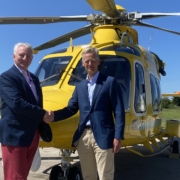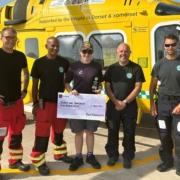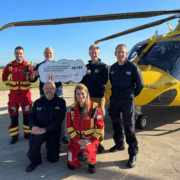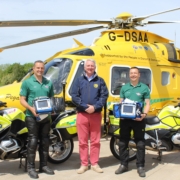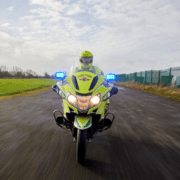Dorset and Somerset Air Ambulance encourages people to plan ahead to help save lives together
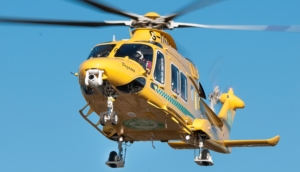
Dorset and Somerset Air Ambulance (DSAA) is working alongside the South Western Ambulance Service NHS Foundation Trust (SWASfT) and their air ambulance colleagues in the region, to promote a campaign called ‘Saving Lives Together’.
Latest data released by SWASfT reveals that in the last six years the Trust has responded to and provided a resuscitation attempt for over 21,000 patients. 75% of these patients experienced a cardiac arrest at a private location such as a home or holiday address. An out of-hospital cardiac arrest (OHCA) is a medical emergency when a person’s heart stops beating suddenly causing a person to fall unconscious and stop breathing normally. 65% of patients who experienced a OHCA received bystander CPR before the arrival of the first ambulance response.
Last year approximately 1 in 3 air ambulance missions were to patients experiencing a cardiac arrest. DSAA’s critical care team are able to deliver hospital level treatment to the scene of a cardiac arrest incident very quickly and then convey patients rapidly to the most suitable hospital. They are also able to reach patients in locations that aren’t always possible
by road.
That’s why the charity believes this campaign is so important and why they are asking local residents to Dorset and Somerset and visitors to the area, to plan ahead by knowing what to do if a medical emergency, such as a cardiac arrest, happens at home by:
• Knowing how to describe your exact location in a remote or rural area using What3Words – a free app which converts your location into a unique three word address that can be used to help find you in an emergency. www.what3words.com
• Spending 15 minutes to learn how to do CPR by visiting the SWASfT Saving Lives Together webpage: www.swast.nhs.uk/welcome/campaigns/savinglivestogether
• Learning where your nearest defbrillator is by visiting the ‘Circuit’ national defibrillator database: www.defibfinder.uk or by visiting the SWASfT link above.
Ollie Zorab, Specialist Practitioner in Critical Care for DSAA and SWASfT’s Clinical Lead for Out-of-Hospital Cardiac Arrest explains more: “With a high proportion of cardiac arrests taking place at a private location, it will sadly mean that you’re more likely to perform CPR on a loved one, then you will on a stranger. We want to empower people to know what to do, should the worst happen, so you can help us to help you. I often hear people say they would be worried about hurting somebody when performing CPR or using a defibrillator. In reality, when someone has a sudden, unexpected cardiac arrest, doing nothing is the only way of making their situation worse. Public access defibrillators are simple pieces of equipment which are easy to use and don’t require any training. If you have to use a device, it will provide clear instructions telling you what you need to do.”
In a life-threatening emergency, dial 999 and request an ambulance. For non life threatening emergencies, people can access appropriate care by calling 111, visiting www.111.nhs.uk, contacting their GP or getting advice from a pharmacy.
